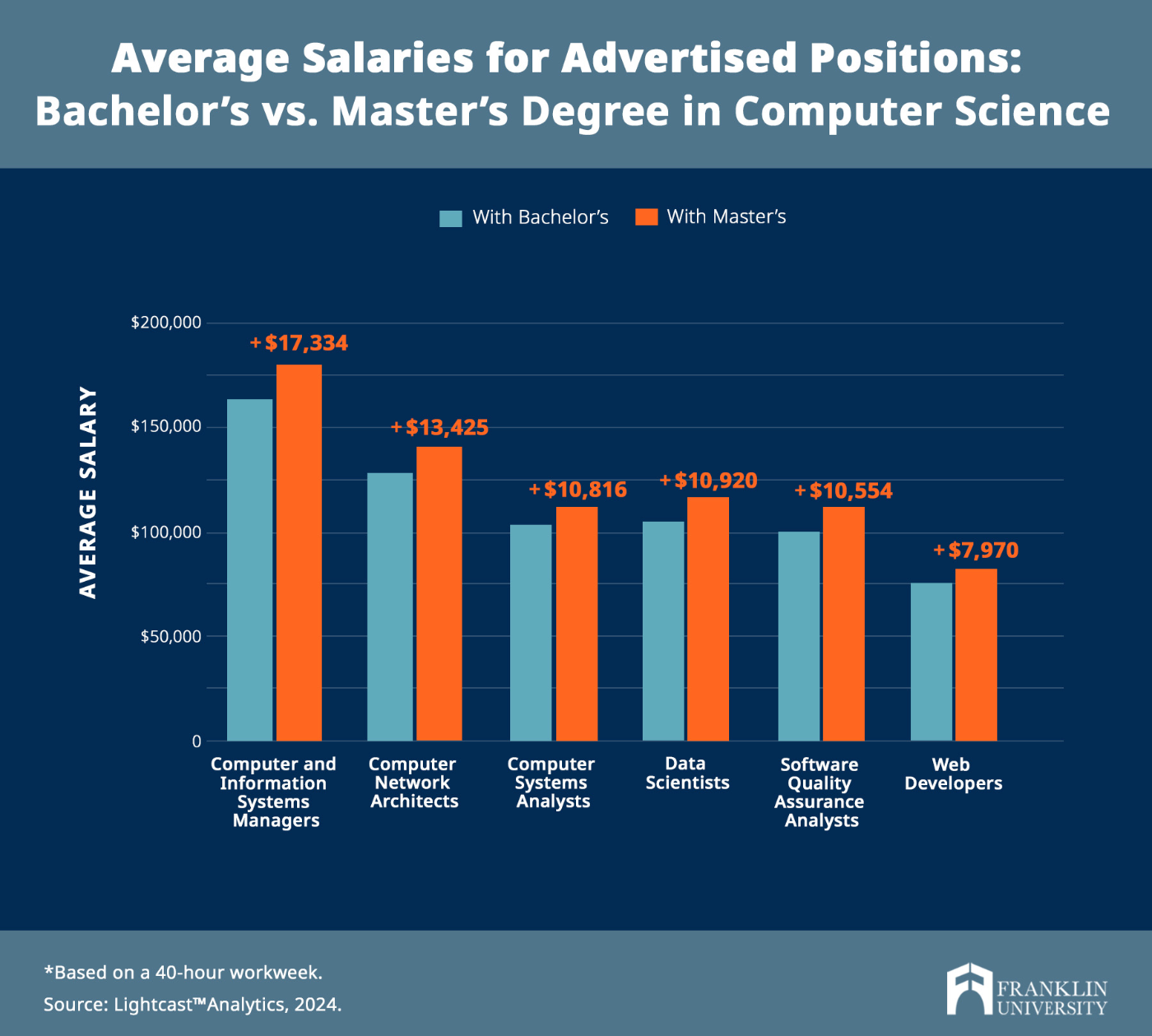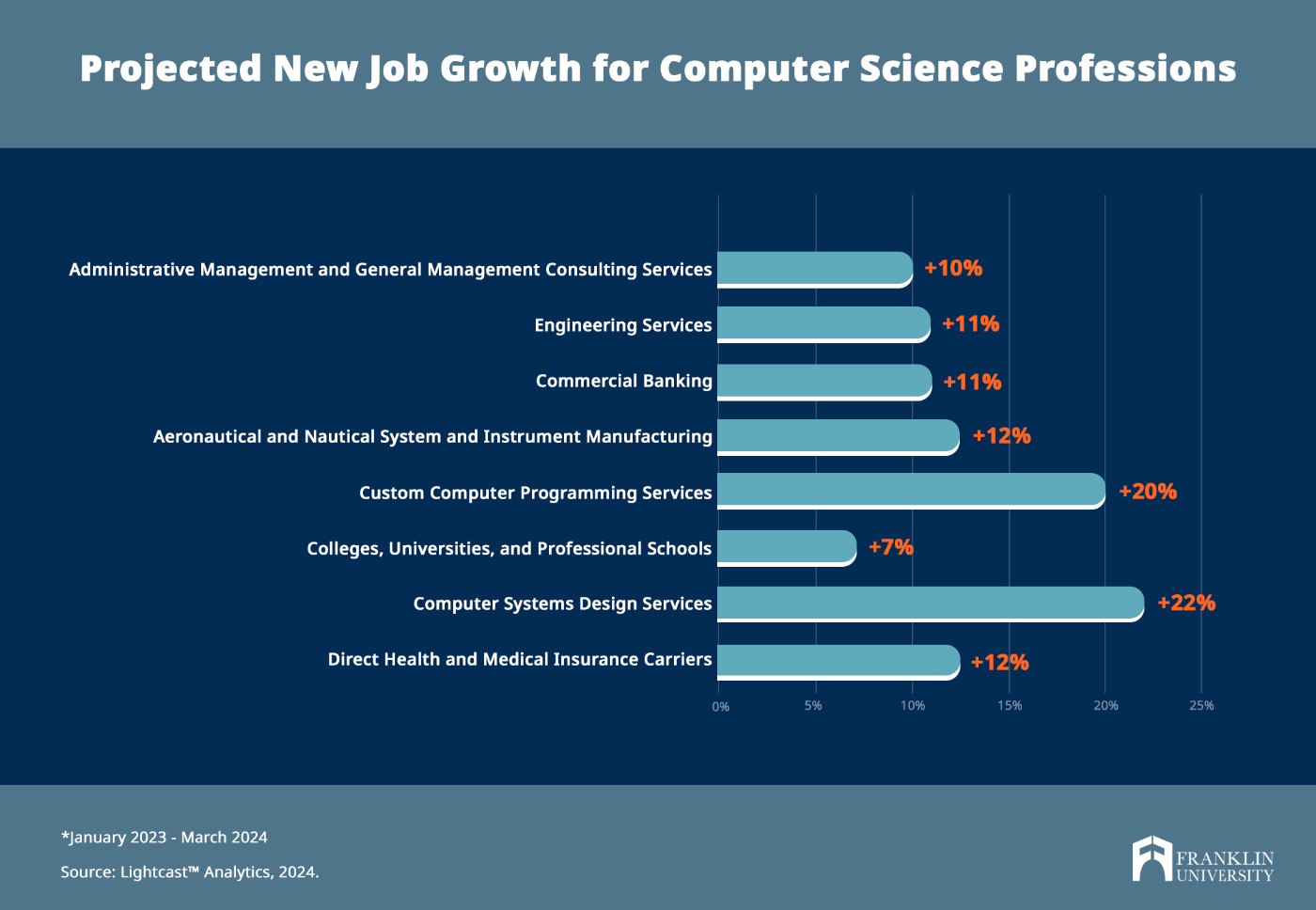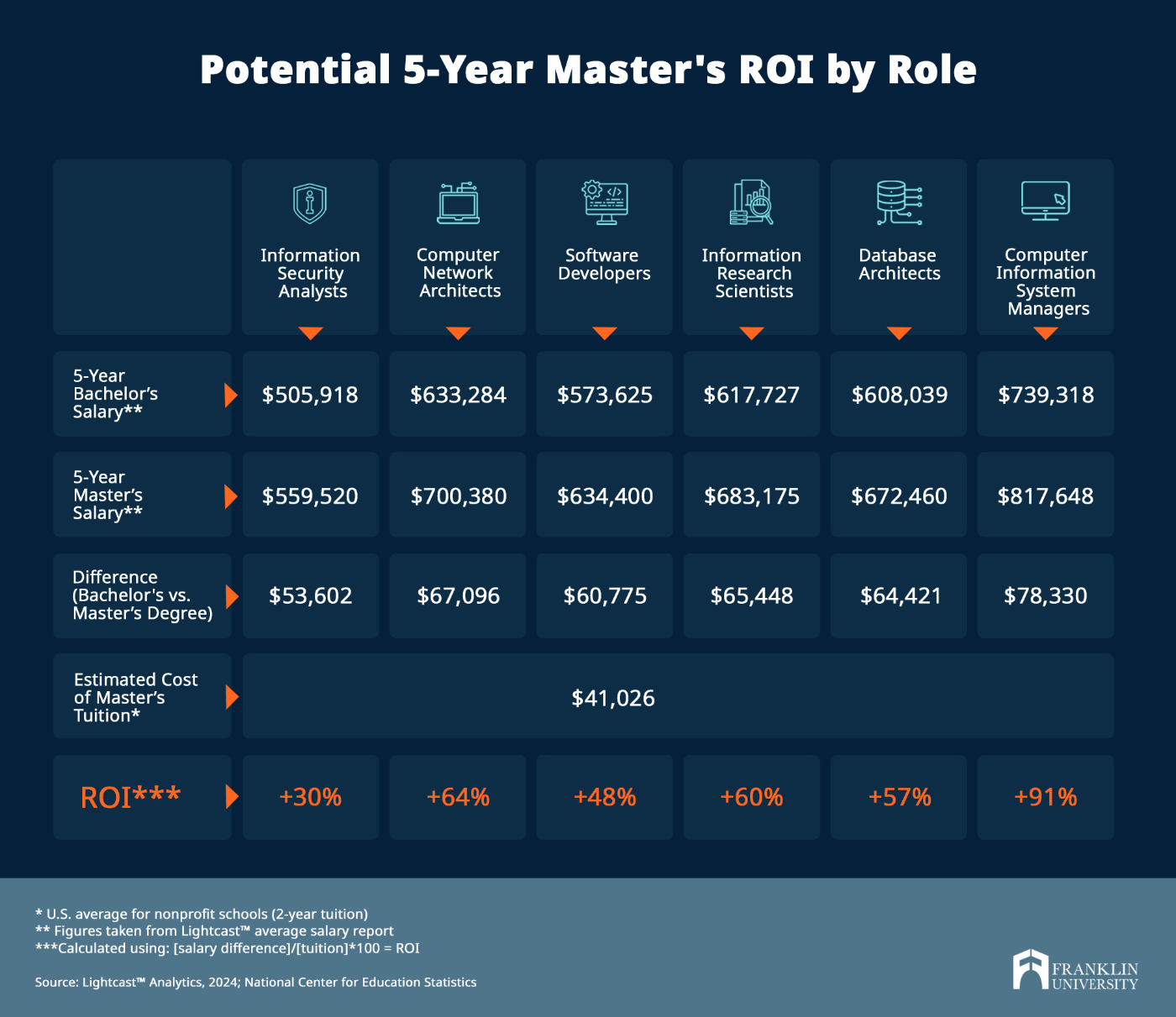Request Information
We're Sorry
There was an unexpected error with the form (your web browser was unable to retrieve some required data from our servers). This kind of error may occur if you have temporarily lost your internet connection. If you're able to verify that your internet connection is stable and the error persists, the Franklin University Help Desk is available to assist you at helpdesk@franklin.edu, 614.947.6682 (local), or 1.866.435.7006 (toll free).
Just a moment while we process your submission.

Master's in Computer Science Salary: What Pay Can You Expect?
This lucrative field of computer science encompasses a wide range of applications, from software development to artificial intelligence and cybersecurity.
With the demand for skilled computer scientists on the rise and growth expected to surge by 21% over the next 10 years (Lightcast™), obtaining a master's degree in CS can (1) greatly enhance your career trajectory and (2) help you secure a competitive salary.
In addition, the Bureau of Labor Statistics (BLS) predicts that employment in computer and information technology occupations will grow faster than average from 2022 to 2032. On average, about 377,500 openings are projected yearly in these occupations. This is the result of employment growth and the need to replace workers who leave or retire from these occupations permanently.
For these reasons, pursuing a master's degree in computer science can be an excellent investment if you're looking to advance your knowledge, increase job opportunities and elevate your earning potential.
Average Salary for a Master’s in Computer Science
The average salary for professionals with an advanced degree in computer science reflects their expertise and knowledge in the field. It also showcases the value placed on specialized expertise and advanced qualifications in the rapidly evolving field of computing technology.
According to the advertised salary report from Lightcast™, which shows the average pay rates from over 200,000 job postings across the United States between January 2023 and March 2024, the median annual salary for those with a master's degree in CS is $135,033. This works out to be approximately $64.92 hourly.
Factors Influencing Salary Potential
While the figures above provide a general benchmark for what you can expect an average salary to be, it's not a one-size-fits-all system. Your earning potential in this field can also be affected by several other factors.
Dr. Chunbo Chu, chair of the B.S. and M.S. in Computer Science programs at Franklin University, provides his professional insights into this, stating that:
"Professionals with a master's degree in computer science often see an average salary boost compared to those with an undergraduate degree,” Chu said. “Other aspects include specialization, industry demand, experience, performance and contributions."
As is commonplace across many fields, salaries for computer science professionals tend to increase as individuals gain more experience and advance into senior roles.
However, it's important to note that the cost of living and industry demand can cause regional variations in computer science salaries across the United States.
Salary Comparison: Bachelor’s Degree vs. Master’s Degree in Computer Science
One of the clearest advantages of pursuing a graduate degree in computer science is the potential for a substantial salary increase compared to those with only a bachelor's degree.
Through the advertised salary report from Lightcast™, we see that an undergraduate degree in computer science pays an average of $120,702 per year. In comparison, a master's degree sees that median salary jump to $135,033 annually—a substantial difference of $14,331 per year.

The higher salary associated with a master's degree compared to a bachelor’s degree reflects the value placed on specialized expertise and advanced qualifications.
“A master's in CS positions individuals for leadership roles or highly specialized areas with strong earning potential,” Dr. Chu said. “Students should focus on developing in-demand skills, such as coding, problem-solving, designing solutions (algorithms) and high-level computer knowledge through their coursework, practice and personal projects.”
Employers often seek candidates with these advanced skills for roles requiring in-depth knowledge, critical thinking and problem-solving that’s honed through advanced academic training.
Job Opportunities for Computer Science Graduates
In addition to higher potential earnings, an M.S. can lead to more advanced and specialized jobs within the field of computer science. This includes career paths such as artificial intelligence/machine learning engineer, data scientist, cybersecurity specialist, blockchain developer, computer vision engineer, game developer and much more.
While relevant certifications can provide valuable skills, they typically have a shorter lifespan and may not carry the same weight as a degree.
“A certification may only last a few years before you need to sit for the exam again to re-certify," explains Dr. Chu, "Many employers also tend to hire people with degrees over certifications only, and senior IT jobs are generally only open to those with degrees. While it's certainly not unheard of to hire people without an IT degree, it's the exception rather than the rule.”
While a formal degree alone is desirable among hiring companies, the specialized knowledge and skills from a master's program are particularly attractive. Tailoring your expertise in areas such as artificial intelligence, cybersecurity, data science and software engineering can give you the means to stand out in a competitive job market.
In many cases, it gives candidates with a master's degree the edge over those with just a bachelor's degree or certification.

Comparing Careers in Computer Science
From computer and information research to data and machine learning, there's no shortage of companies looking for educated workers.
As a result of this demand, professionals with a master's in computer science may be better positioned to secure high-paying roles.
Lightcast™ shows that some of the most lucrative careers for those holding an M.S., on average, are:
- Information Security Analysts: $53.80 per hour
- Computer Network Architects: $60.89 per hour
- Software Developers: $61.00 per hour
- Database Architects: $64.66 per hour
- Information Research Scientists: $65.69 per hour
- Computer Information Systems Managers: $78.62 per hour
For more information on other occupations you can pursue with a computer science degree, visit our dedicated blog post, What Can You Do with a Computer Science Degree?
Industries Valuing a Master’s in Computer Science
The demand for computer science professionals is expected to remain strong in the coming years. Certain industries are particularly active in recruiting and offering competitive salaries for those with a master's degree in computer science, including:
- Technology: With an ever-increasing reliance on software, hardware and digital solutions, the technology and data science sectors remain a significant hub for computer science talent and innovation.
- Finance: Financial institutions heavily leverage data analysis, cybersecurity and sophisticated algorithms. This has created a high demand for skilled computer science professionals.
- Healthcare: The healthcare industry continues to adopt new technologies for electronic health records, medical research and patient care. These technological innovations and their maintenance requirements require computer science expertise.
- Government: Federal agencies, defense contractors and research institutions seek computer scientists to develop and maintain essential systems and infrastructure.
- Education: Colleges and universities rely on computer science experts to teach, research and develop educational technologies.
Financial Return on Your Master's Degree
While pursuing an advanced degree in computer science involves investing time and financial resources, the long-term benefits more than outweigh the costs.
According to data from the National Center for Education Statistics, the yearly average cost of tuition across private and public graduate schools offering master’s degrees is $41,026. This includes tuition itself, living expenses and other miscellaneous costs associated with getting a degree.
When it comes to paying for school, grants are among your best options. But do you know how to find them? Remove the guesswork by downloading this free guide
Dr. Chu points out that the median salary offered by employers post-graduation will “more than pay off the cost of earning your master’s degree in computer science over your lifetime.” And with the average salary across jobs in the CS industry expected to increase by 22.16% between 2023 and 2033 (Lightcast™), this ROI will likely continue to grow.

Ready to Improve Your Earnings with a Master’s in CS?
As the field of computer science continues to grow and evolve, there is no better time than now to pursue a master's degree and unlock the potential for career advancement, financial stability and long-term success.
Request more information today and discover how a master's from Franklin University can support your career goals. Prospective computer science students can benefit from the convenience of multiple start dates as applications are accepted year-round. Start your application today and experience the Franklin University difference for yourself.





